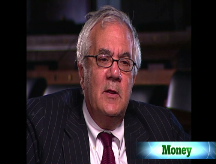Fed ruling: Attorney talk confidential
Justice Department ruling says federal prosecutors can't strong-arm corporate suspects into waiving attorney-client privilege.
ATLANTA (CNN) -- Responding to intense criticism from corporations, legal groups, and key members of Congress, the Justice Department announced Thursday that federal prosecutors will no longer be able to strong-arm corporate targets to reveal protected conversations with their attorneys.
Deputy Attorney General Mark Filip traveled to New York and announced at the New York Stock Exchange that investigators and prosecutors are being informed they cannot use the threat of criminal indictment and prosecution to coerce company executives into waiving attorney-client privilege.
Filip and his boss, Attorney General Michael Mukasey, had signaled to angry senators last month that such changes would be coming, and urged them not to pass House-approved legislation requiring those revisions.
Immediate reaction to the changes were mixed, with people voicing both support and complaints that the new rules don't go far enough.
The previous guidelines - approved in 2006 by then-Deputy Attorney General Paul McNulty - followed the Enron scandal, and were intended to help prosecutors aggressively combat corporate scandals that could harm employees and stockholders.
But that controversial "McNulty memo" was blasted by critics who argued it opened the door to widespread use of so-called privilege waivers that, in turn, prevented candid communications between corporations and their legal counsel. The rules also allowed prosecutors to brand companies as failing to cooperate if they did not sanction or fire employees under scrutiny.
Filip said corporate cooperation will now be measured solely by the extent to which a firm discloses relevant facts and evidence, and not whether it waives attorney-client privilege.
However, he also said the limitations will not include attorney-client communications that were made in furtherance of a crime or fraud.
Justice Department officials said they approved the new rules only after discussing them with a variety of interests, including corporate and criminal defense attorneys and civil liberties groups.
Filip recently told lawmakers the meetings found some common ground, but there remained "obvious difference of opinion ...in some key areas."
Sen. Arlen Specter of Pennsylvania, the ranking Republican on the Senate Judiciary Committee and sponsor of the bill to curb the government's prosecutorial tactics, said the changes are not enough for him to drop his legislation.
"The revised guidelines are a step in the right direction but they leave many problems unresolved, so that legislation will still be necessary," he said. He criticized the guidelines for encouraging corporations to comply with waiver programs of other agencies, including the SEC and EPA.
Committee Chairman Patrick Leahy, Democrat of Vermont, issued a statement calling the announced rules a "significant and welcome change," and notably not calling for legislation.
He encouraged other agencies to embrace the Justice Department approach to corporate investigations. He added he will "study the new policy ...and continue to be vigilant on this issue."
The Coalition to Preserve Attorney-Client Privilege released a statement calling the changes "a clear and substantive improvement" but insisted Congress must still act "to ensure a permanent and lasting solution."
The broad coalition includes the U.S. Chamber of Commerce, the Business Roundtable, the American Civil Liberties Union, and the National Association of Criminal Defense Lawyers, among others.
"The Justice Department's track record of 5 different policies in 10 years cries out for a permanent legislative solution that cannot be revised at the whim of each new deputy attorney general," the coalition said. "The only way to ensure compliance is to make the policy law."
Among 13 Senate co-sponsors of the Specter legislation are Democratic vice-presidential nominee Sen. Joe Biden of Delaware, and a key John McCain supporter, Sen. Lindsay Graham, R-South Carolina. ![]()



